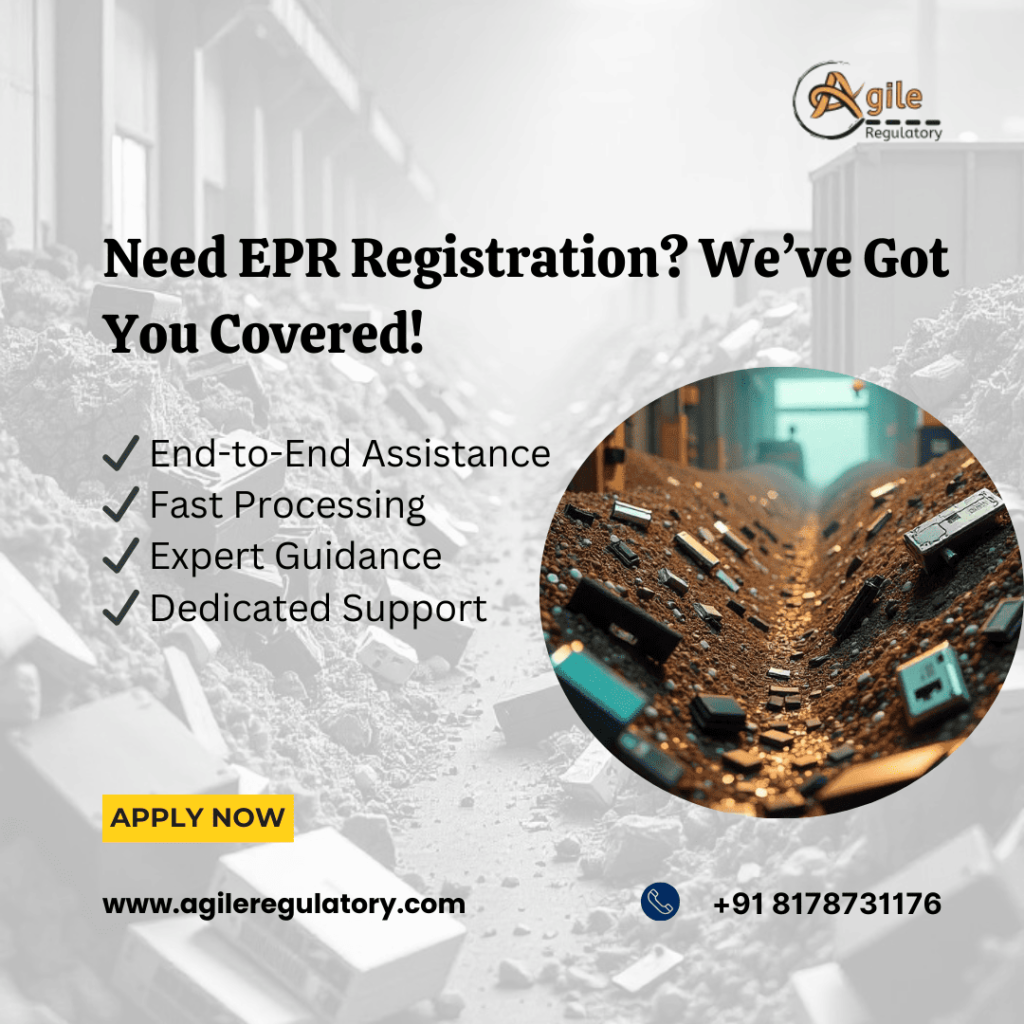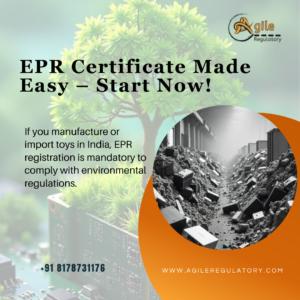Introduction
Extended Producer Responsibility (EPR) is a policy approach where manufacturers, importers, and brand owners are held responsible for the environmental impact of their products throughout the product lifecycle. In the context of the toys sector, an EPR certificate ensures compliance with waste management norms, sustainability practices, and recycling obligations.
What is an EPR Certificate?
An EPR certificate is an official authorization granted to producers, importers, or brand owners, mandating them to manage the disposal and recycling of their products after they reach the end of their lifecycle. It is particularly important in the toys industry, which heavily relies on plastic, electronic, and non-biodegradable materials that contribute to environmental waste.
Importance of EPR Certificate in the Toys Industry
- Environmental Responsibility: Many toys contain plastic and electronic components that are non-biodegradable, making waste management crucial.
- Regulatory Compliance: Governments worldwide have started implementing stringent rules for toy manufacturers to ensure they comply with sustainable waste disposal practices.
- Consumer Awareness: Parents and consumers are becoming more conscious of eco-friendly products, increasing the demand for sustainable toys.
- Circular Economy: EPR promotes recycling and reusability, leading to reduced raw material extraction and a lower carbon footprint.
EPR Regulations for the Toys Sector
Different countries have specific regulations concerning EPR for toys. In India, for example, the E-Waste Management Rules, 2016 and Plastic Waste Management Rules, 2016 require toy manufacturers to be accountable for the proper disposal of electronic and plastic waste. Similarly, in the European Union, the Waste Electrical and Electronic Equipment (WEEE) Directive applies to electronic toys.
Steps to Obtain an EPR Certificate for Toys
- Identify Regulatory Requirements: Understand the applicable EPR regulations in your country or region.
- Register with Regulatory Authorities: In India, for instance, producers must register with the Central Pollution Control Board (CPCB) or State Pollution Control Board (SPCB).
- Develop a Waste Management Plan: Create a detailed plan outlining how the company will handle waste collection, recycling, and disposal.
- Engage with PROs (Producer Responsibility Organizations): PROs help manage the collection and recycling process on behalf of manufacturers.
- Compliance Documentation and Submission: Submit the necessary documents, including waste management reports and recycling commitments.
- Obtain EPR Authorization: Once the authorities review and approve the application, the company receives an EPR certificate.
Challenges in Implementing EPR in the Toys Sector
- High Cost of Compliance: Setting up waste collection and recycling mechanisms can be expensive for small and medium-sized enterprises (SMEs).
- Lack of Awareness: Many toy manufacturers are unaware of EPR obligations and the importance of sustainable waste management.
- Limited Recycling Infrastructure: Some countries lack the necessary infrastructure to recycle and dispose of toy-related waste efficiently.
- Complex Regulatory Frameworks: Different countries have different EPR requirements, making compliance challenging for international toy brands.
Benefits of EPR in the Toys Industry
- Promotes Sustainability: Encourages the production of eco-friendly toys and the use of biodegradable materials.
- Enhances Brand Reputation: Companies that follow EPR guidelines gain consumer trust and market credibility.
- Encourages Innovation: Pushes manufacturers to design toys that are easier to recycle and have a lower environmental impact.
- Reduces Landfill Waste: Ensures proper recycling and disposal of non-biodegradable materials, reducing pollution levels.
How Agile Regulatory Helps in EPR Certification
Agile Regulatory specializes in assisting toy manufacturers and importers with seamless EPR certification. Their services include:
- Regulatory Guidance: Providing expert advice on legal requirements and compliance.
- Documentation Assistance: Preparing and submitting necessary documents.
- Liaison with Authorities: Coordinating with CPCB and SPCB for approvals.
- Recycling Partnerships: Helping businesses collaborate with authorized recyclers.
Conclusion
The EPR certificate is a crucial requirement for toy manufacturers, importers, and brand owners to ensure environmental sustainability and regulatory compliance. As consumer demand for eco-friendly products rises, EPR policies will continue to evolve, making the toys industry more responsible and sustainable. Businesses that proactively adopt EPR measures will benefit from improved brand reputation, reduced environmental impact, and better market positioning.




